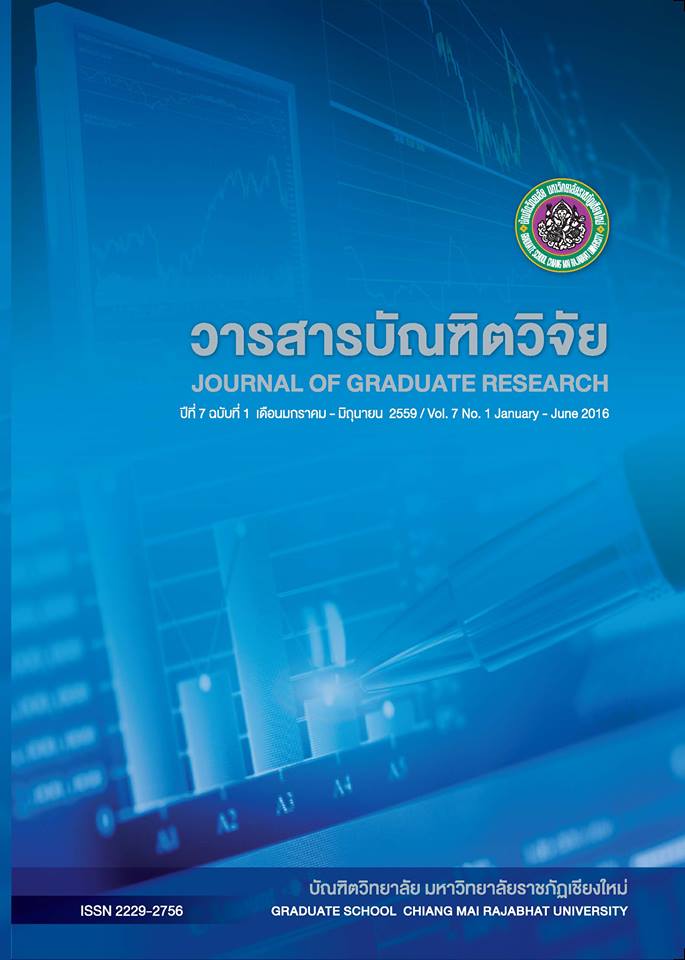แรงงานต่างด้าวกับความมั่นคงทางสังคม
Main Article Content
บทคัดย่อ
แผนงานวิจัย เรื่อง แรงงานต่างด้าวกับความมั่นคงทางสังคมนี้ มีวัตถุประสงค์ เพื่อศึกษารูปแบบ การปรับตัวของแรงงานต่างด้าวในด้านต่าง ๆ ที่มีผลกระทบต่อความมั่นคงในชีวิตและสังคมไทยและสร้างความเข้มแข็งให้กับชุมชนสู่การสร้างความมั่นคงของประเทศ โดยมีโครงการวิจัยย่อยร่วมดำเนินการทั้งหมด 4 โครงการ ได้แก่ 1) ชุมชนกับการจัดการปัญหาแรงงานต่างด้าว : กรณีศึกษาบ้านต้นโชค ตำบลหนองบัว อำเภอไชยปราการ จังหวัดเชียงใหม่ 2) การปรับตัวของแรงงานหญิงข้ามชาติภายใต้นโยบายความมั่นคงของชาติ : กรณีศึกษาแรงงานหญิงข้ามชาติสัญชาติไทใหญ่ในเมืองเชียงใหม่ 3) โอกาสการเข้าถึงสวัสดิการสังคมของแรงงานข้ามชาติ : กรณีศึกษาแรงงานข้ามชาติในเขตเทศบาลนครเชียงใหม่ และ 4) ภาษากับความมั่นคงในชีวิต : กรณีศึกษาแรงงานไทใหญ่ใน แขวงนครพิงค์ อำเภอเมือง จังหวัดเชียงใหม่
แผนงานวิจัยนี้ เป็นการวิจัยประยุกต์ ซึ่งมีข้อมูลเป็นเชิงปริมาณ และเชิงคุณภาพจากการศึกษา 8 มิติ ของความมั่นคงทางสังคมที่ได้จากกลุ่มตัวอย่างเป็นแรงงานชาวไทใหญ่ในชุมชนแขวงนครพิงค์ อำเภอเมือง และอำเภอไชยปราการ จังหวัดเชียงใหม่ ทุกโครงการย่อยใช้วิธีการเก็บข้อมูลด้วยการสัมภาษณ์เชิงลึก การสนทนากลุ่ม การจัดกิจกรรมกลุ่ม การสังเกต การตอบแบบสอบถามและการศึกษาเอกสารที่เกี่ยวข้อง เมื่อทุกโครงการย่อยวิเคราะห์ข้อมูลเพื่อตอบวัตถุประสงค์แล้วเสร็จ หัวหน้าแผนงานวิจัยได้นำผลดังกล่าวมาสังเคราะห์ เพื่อตอบวัตถุประสงค์ของแผนงานวิจัย
ผลการวิจัยสรุปได้ว่า การปรับตัวของแรงงานต่างด้าวชาวไทใหญ่ในจังหวัดเชียงใหม่ อันมีผลกระทบต่อความมั่นคงในชีวิต และสังคมมีทั้ง 8 มิติ คือ
1. มิติด้านการมีงานทำและรายได้
2. มิติด้านครอบครัว
3. มิติด้านความมั่นคงส่วนบุคคล
4. มิติด้านการสนับสนุนทางสังคม
5. มิติด้านสังคมและวัฒนธรรม
6. มิติด้านการศึกษา
7. มิติด้านสุขภาพอนามัย
8. มิติด้านที่อยู่อาศัยและสิ่งแวดล้อมทางกายภาพ
ซึ่งผลการประเมินความมั่นคงในภาพรวม พบว่า ชาวไทใหญ่ในจังหวัดเชียงใหม่มีความ เห็นว่า พวกเขามีระดับความมั่นคงอยู่ในระดับปานกลาง ( = 3.25 ) กล่าวคือ มีความมั่นคงน้อย ในมิติด้านที่อยู่อาศัยและสิ่งแวดล้อมทางกายภาพ มีความมั่นคงปานกลาง ในมิติด้านการมีงานทำ และรายได้ มิติด้านความมั่นคงส่วนบุคคล มิติด้านการสนับสนุนทางสังคม มิติด้านสุขภาพอนามัย และมีความมั่นคงค่อนข้างสูง ในมิติ ด้านครอบครัว และมิติด้านสังคมและวัฒนธรรม
TRANS – BORDER WORKFORCE AND SOCIAL SECURITY.
This research project aims to study the adaptation-pattern of Trans – border Workforces in eight aspects, which effects social security, Thai society and community strengthening that lead to the our country’s security situation. There are 4 researches in this project: 1) community and the Trans – Border Workforce’s Problem Management: Case Study Baan Ton Chok Tambon Nong Bua, Chaiprakarn District, Chiang Mai Province 2) the Adapting of Women Trans – Border Workforces Under the Social Security Policy: Case Study Myanmar Women Trans – Border Workforces in Chiang Mai City 3) the Opportunity in Social Welfare of Trans – Border Workforces: Case Study Trans – Border Workforces in Chiang Mai Municipality, and 4) Language and Life Security: Case Study Myanmar Trans – Border Workforces in Nakornping Sub-District, Muang District, Chiang Mai Province.
This research project is an applied research. Data were collected in a quality research pattern from the samples; Tai Yai Workforces in Nakornping Sub - District, Muang District and Chaiprakarn District, Chiang Mai Province. Every research under this project used many methods to collect data such as in - depth interviews, group conversations, group activities, observation, questionnaires and related literature reviews. All data from 4 researches were integrated by the project’s leader to answer the objectives of this project.
The conclusion shown that the way of life adapting of Tai Yai Trans – border workforces in Chiang Mai, which effecting their life and social security, can be categorized in to 8 aspects;
1. Work and Income
2. Family
3. Personal Security
4. Social Support
5. Social and Culture
6. Education
7. Residence and Environment
8. Health
The evaluation shown that Tai Yai Trans – border workforces in Chiang Mai Province felt that they had only a medium level of the security in their life and society ( = 3.25 ). This means that they have least level of security in term of Work and Income, and Residence and Environment, but they gain medium level of security in term of Personal Security, Social Support, and Health. For the Family and Social and Culture aspects, they have rather high level of security


